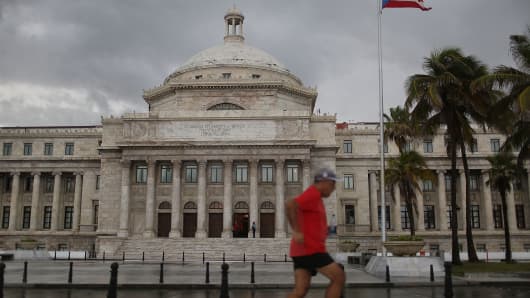I hope no one here in the U.S. is feeling too smug about the financial fiasco dragging on in Greece. Because we have a pretty similar problem on our own island called Puerto Rico and just like Greece, socialist/welfare state policies are the primary culprit.
Puerto Rico seems to have avoided the immediate threat of default for now by making $1.9 billion worth of debt payments that were due July 1st. But Puerto Rico Gov. Alejandro Garcia Padilla said his island's troubled economy was in a "death spiral" earlier this week, and it's hard to argue with the spirit of his comments. Just like Greece, Puerto Rico has become a tragic case of what happens to any municipality when there are just too many incentives not to work.
Read MoreWhy are we ignoring this colossal socialist failure?
Even though entitlement spending continues to soar out of control in America, the myth of the "welfare queen" is still thankfully a myth. Working for a low wage is still a better choice than going on public assistance in almost every possible scenario in the 50 states. But in Puerto Rico that's not always the case. The low cost of living there is not factored in to food stamp and Social Security benefit payments coming from Washington. The same is true of the generous Pell Grant and federally backed student loan programs that go a lot farther to cover education costs in Puerto Rico. U.S. taxpayers are literally subsidizing options that discourage work on the island territory. And people there are simply doing the math.
And the math includes some eye-popping numbers and shocking policies that were exacerbated by the Great Recession. Social Security disability payments are just one example, but the SSA's own internal reports showed that in 2010 nine of the top 10 zip codes for workers receiving disability benefits were on Puerto Rico. Applicants for disability payments were approved at a rate of 69% in 2010 compared to just 36% four years earlier. Things got even more ridiculous this spring when it was revealed that not being able to speak English was considered a legitimate disability on the island. Thankfully, only a handful of Puerto Rican citizens actually got payments based on that claim. But even before the Great Recession, The Economist bluntly labeled Puerto Rico as "Welfare Island."
Read MoreThe jobs report is missing something big
Businesses face a very challenging environment there as well. Puerto Rico imposes the same federal minimum wage as we have in the 50 states, making it much more costly to employ workers there than on its neighboring islands in the Caribbean. So not only is there a strong incentive not to work in Puerto Rico, there's also a pretty good reason not to create jobs there as well.
But don't demonize the Puerto Rican people because this is not unique to them. It's really simple economics. If the government subsidizes an activity, that activity will increase and the people who benefit from those subsidies will likely become the fastest growing part of the population. Puerto Rico's overall population has actually been decreasing over the past decade, but the island is mostly losing its younger, middle class, and more educated people while the poorer and older population stays put and grows.
Read More'Tax the Church' groups look to gain momentum
And that's where there is another stark similarity to the Greek situation that actually doesn't have much to do with welfare. Even before massive taxpayer entitlements came ashore on Puerto Rico, the island's labor participation rate was below 50% because it was easy for its hard working and ambitious residents to move and work legally to the United States where there was much more opportunity. That practice is simply increasing right now. Meanwhile, the European Union arrangement has also made it easier for the best skilled or hardest working Greeks to leave their country and legally find work in more prosperous regions of the E.U. It's a simple case of "brain drain" on two hemispheres.
That's why austerity measures and other policies like it won't really help. Government entitlements should be cut gradually over time and fraud should be stamped out immediately, but what can Puerto Rico do to actually attract new wealth and keep its best human resources on shore? Starting in 2012, the government in San Juan passed new laws to lure millionaires that included no capital gains taxes and a 4% tax rate on their businesses if they make Puerto Rico their primary residence. Of course that leaves the shrinking number of middle class and working poor Puerto Ricans holding the bag on an increased personal tax burden. One would hope that would lead the government to at least consider cutting taxes for everyone, but that is probably wishful thinking.
And it's also probably wishful thinking that American politicians from both parties will learn the important lessons Greece and Puerto Rico are providing our country with right now. If we don't find a way to shrink entitlements and increase the incentives to work and create wealth, we're headed for the same kind of pain.



